Podcast: Play in new window | Download (Duration: 16:45 — 11.6MB) | Embed
Subscribe: Apple Podcasts | Spotify | Amazon Music | Android | Pandora | iHeartRadio | JioSaavn | Podchaser | Gaana | Podcast Index | Email | TuneIn | Deezer | Anghami | RSS | More
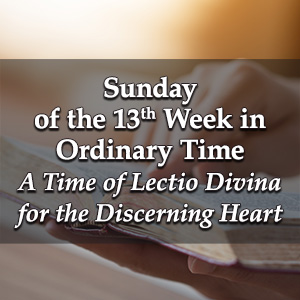 Sunday of the Thirteenth Week of Ordinary Time – A Time of Lectio Divina for the Discerning Heart Podcast
Sunday of the Thirteenth Week of Ordinary Time – A Time of Lectio Divina for the Discerning Heart Podcast
As you begin, take a deep breath and exhale slowly. For at least the next few moments, surrender all the cares and concerns of this day to the Lord.
Say slowly from your heart “Jesus, I Trust In You…You Take Over”
Become aware that He is with you, looking upon you with love, wanting to be heard deep within in your heart…
From the Holy Gospel According to St. Mark 5:21-43
When Jesus had crossed in the boat to the other side, a large crowd gathered round him and he stayed by the lakeside. Then one of the synagogue officials came up, Jairus by name, and seeing him, fell at his feet and pleaded with him earnestly, saying, ‘My little daughter is desperately sick. Do come and lay your hands on her to make her better and save her life.’ Jesus went with him and a large crowd followed him; they were pressing all round him.
Now there was a woman who had suffered from a haemorrhage for twelve years; after long and painful treatment under various doctors, she spent all she had without being any the better for it, in fact, she was getting worse. She had heard about Jesus, and she came up behind him through the crowd and touched his cloak. ‘If I can touch even his clothes,’ she had told herself ‘I shall be well again.’ And the source of the bleeding dried up instantly, and she felt in herself that she was cured of her complaint. Immediately aware that power had gone out from him, Jesus turned round in the crowd and said, ‘Who touched my clothes?’ His disciples said to him, ‘You see how the crowd is pressing round you and yet you say, “Who touched me?”’ But he continued to look all round to see who had done it. Then the woman came forward, frightened and trembling because she knew what had happened to her, and she fell at his feet and told him the whole truth. ‘My daughter,’ he said ‘your faith has restored you to health; go in peace and be free from your complaint.’
While he was still speaking some people arrived from the house of the synagogue official to say, ‘Your daughter is dead: why put the Master to any further trouble?’ But Jesus had overheard this remark of theirs and he said to the official, ‘Do not be afraid; only have faith.’ And he allowed no one to go with him except Peter and James and John the brother of James. So they came to the official’s house and Jesus noticed all the commotion, with people weeping and wailing unrestrainedly. He went in and said to them, ‘Why all this commotion and crying? The child is not dead, but asleep.’ But they laughed at him. So he turned them all out and, taking with him the child’s father and mother and his own companions, he went into the place where the child lay. And taking the child by the hand he said to her, ‘Talitha, kum!’ which means, ‘Little girl, I tell you to get up.’ The little girl got up at once and began to walk about, for she was twelve years old. At this they were overcome with astonishment, and he ordered them strictly not to let anyone know about it, and told them to give her something to eat.
What word made this passage come alive for you?
What did you sense the Lord saying to you?
Once more give the Lord an opportunity to speak to you:
When Jesus had crossed in the boat to the other side, a large crowd gathered round him and he stayed by the lakeside. Then one of the synagogue officials came up, Jairus by name, and seeing him, fell at his feet and pleaded with him earnestly, saying, ‘My little daughter is desperately sick. Do come and lay your hands on her to make her better and save her life.’ Jesus went with him and a large crowd followed him; they were pressing all round him.
Now there was a woman who had suffered from a haemorrhage for twelve years; after long and painful treatment under various doctors, she spent all she had without being any the better for it, in fact, she was getting worse. She had heard about Jesus, and she came up behind him through the crowd and touched his cloak. ‘If I can touch even his clothes,’ she had told herself ‘I shall be well again.’ And the source of the bleeding dried up instantly, and she felt in herself that she was cured of her complaint. Immediately aware that power had gone out from him, Jesus turned round in the crowd and said, ‘Who touched my clothes?’ His disciples said to him, ‘You see how the crowd is pressing round you and yet you say, “Who touched me?”’ But he continued to look all round to see who had done it. Then the woman came forward, frightened and trembling because she knew what had happened to her, and she fell at his feet and told him the whole truth. ‘My daughter,’ he said ‘your faith has restored you to health; go in peace and be free from your complaint.’
While he was still speaking some people arrived from the house of the synagogue official to say, ‘Your daughter is dead: why put the Master to any further trouble?’ But Jesus had overheard this remark of theirs and he said to the official, ‘Do not be afraid; only have faith.’ And he allowed no one to go with him except Peter and James and John the brother of James. So they came to the official’s house and Jesus noticed all the commotion, with people weeping and wailing unrestrainedly. He went in and said to them, ‘Why all this commotion and crying? The child is not dead, but asleep.’ But they laughed at him. So he turned them all out and, taking with him the child’s father and mother and his own companions, he went into the place where the child lay. And taking the child by the hand he said to her, ‘Talitha, kum!’ which means, ‘Little girl, I tell you to get up.’ The little girl got up at once and began to walk about, for she was twelve years old. At this they were overcome with astonishment, and he ordered them strictly not to let anyone know about it, and told them to give her something to eat.
What did your heart feel as you listened?
What did you sense the Lord saying to you?
Once more, through Him, with Him and in Him listen to the Word:
When Jesus had crossed in the boat to the other side, a large crowd gathered round him and he stayed by the lakeside. Then one of the synagogue officials came up, Jairus by name, and seeing him, fell at his feet and pleaded with him earnestly, saying, ‘My little daughter is desperately sick. Do come and lay your hands on her to make her better and save her life.’ Jesus went with him and a large crowd followed him; they were pressing all round him.
Now there was a woman who had suffered from a haemorrhage for twelve years; after long and painful treatment under various doctors, she spent all she had without being any the better for it, in fact, she was getting worse. She had heard about Jesus, and she came up behind him through the crowd and touched his cloak. ‘If I can touch even his clothes,’ she had told herself ‘I shall be well again.’ And the source of the bleeding dried up instantly, and she felt in herself that she was cured of her complaint. Immediately aware that power had gone out from him, Jesus turned round in the crowd and said, ‘Who touched my clothes?’ His disciples said to him, ‘You see how the crowd is pressing round you and yet you say, “Who touched me?”’ But he continued to look all round to see who had done it. Then the woman came forward, frightened and trembling because she knew what had happened to her, and she fell at his feet and told him the whole truth. ‘My daughter,’ he said ‘your faith has restored you to health; go in peace and be free from your complaint.’
While he was still speaking some people arrived from the house of the synagogue official to say, ‘Your daughter is dead: why put the Master to any further trouble?’ But Jesus had overheard this remark of theirs and he said to the official, ‘Do not be afraid; only have faith.’ And he allowed no one to go with him except Peter and James and John the brother of James. So they came to the official’s house and Jesus noticed all the commotion, with people weeping and wailing unrestrainedly. He went in and said to them, ‘Why all this commotion and crying? The child is not dead, but asleep.’ But they laughed at him. So he turned them all out and, taking with him the child’s father and mother and his own companions, he went into the place where the child lay. And taking the child by the hand he said to her, ‘Talitha, kum!’ which means, ‘Little girl, I tell you to get up.’ The little girl got up at once and began to walk about, for she was twelve years old. At this they were overcome with astonishment, and he ordered them strictly not to let anyone know about it, and told them to give her something to eat.
What touched your heart in this time of prayer?
What did your heart feel as you prayed?
What do you hope to carry with you from this time with the Lord?
Our Father, who art in heaven,
hallowed be thy name.
Thy kingdom come.
Thy will be done on earth, as it is in heaven.
Give us this day our daily bread,
and forgive us our trespasses,
as we forgive those who trespass against us,
and lead us not into temptation,
but deliver us from evil.
Amen


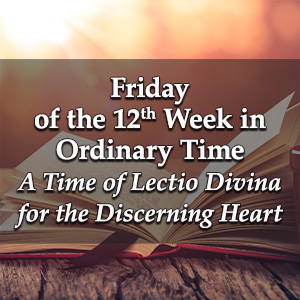 Friday of the Twelfth Week of Ordinary Time – A Time of Lectio Divina for the Discerning Heart Podcast
Friday of the Twelfth Week of Ordinary Time – A Time of Lectio Divina for the Discerning Heart Podcast St. Cyril of Alexandria – The Doctors of the Church: The Charism of Wisdom with Dr. Matthew Bunson
St. Cyril of Alexandria – The Doctors of the Church: The Charism of Wisdom with Dr. Matthew Bunson

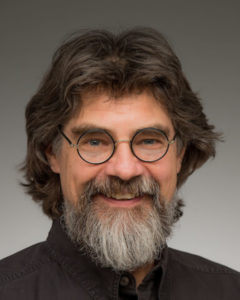




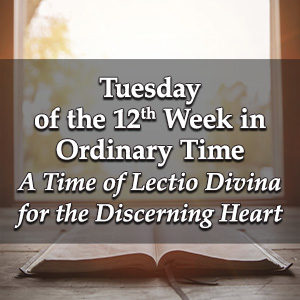 Tuesday of the Twelfth Week of Ordinary Time – A Time of Lectio Divina for the Discerning Heart Podcast
Tuesday of the Twelfth Week of Ordinary Time – A Time of Lectio Divina for the Discerning Heart Podcast

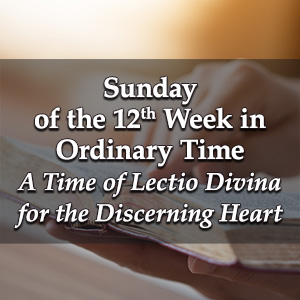 Sunday of the Twelfth Week of Ordinary Time – A Time of Lectio Divina for the Discerning Heart Podcast
Sunday of the Twelfth Week of Ordinary Time – A Time of Lectio Divina for the Discerning Heart Podcast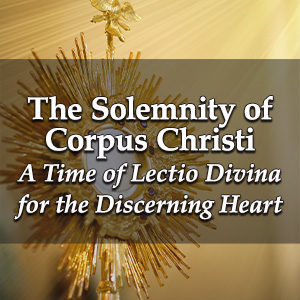 The Solemnity of Corpus Christi – A Time of Lectio Divina for the Discerning Heart Podcast
The Solemnity of Corpus Christi – A Time of Lectio Divina for the Discerning Heart Podcast